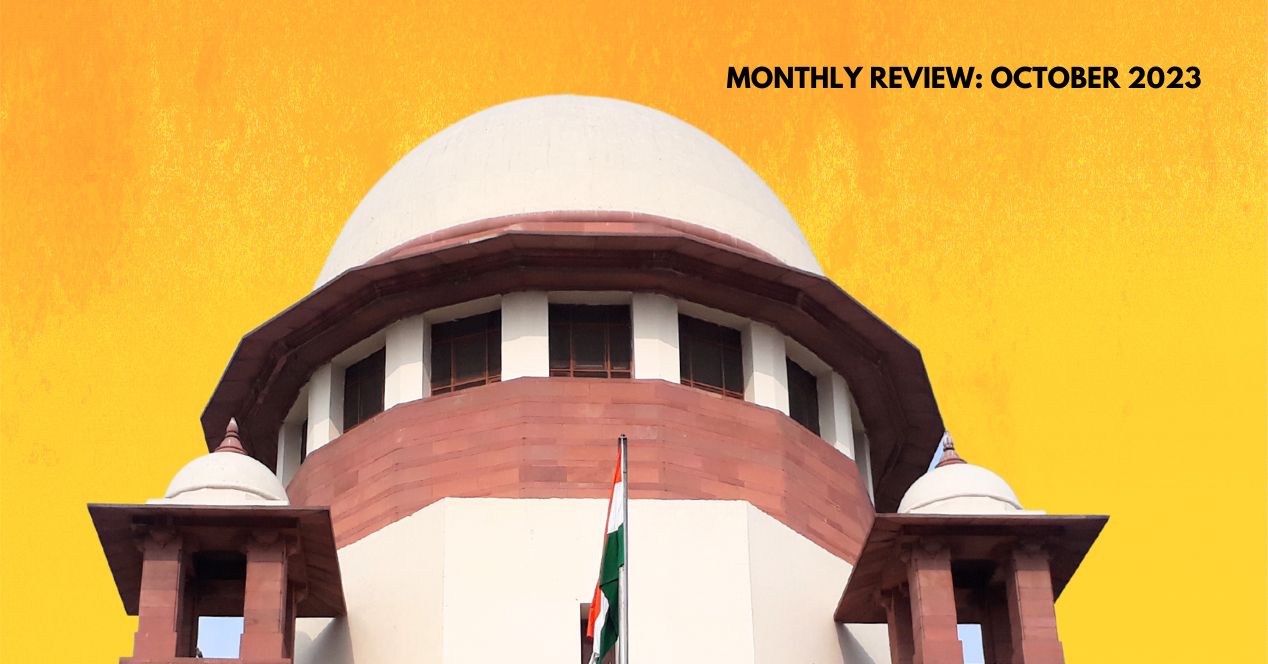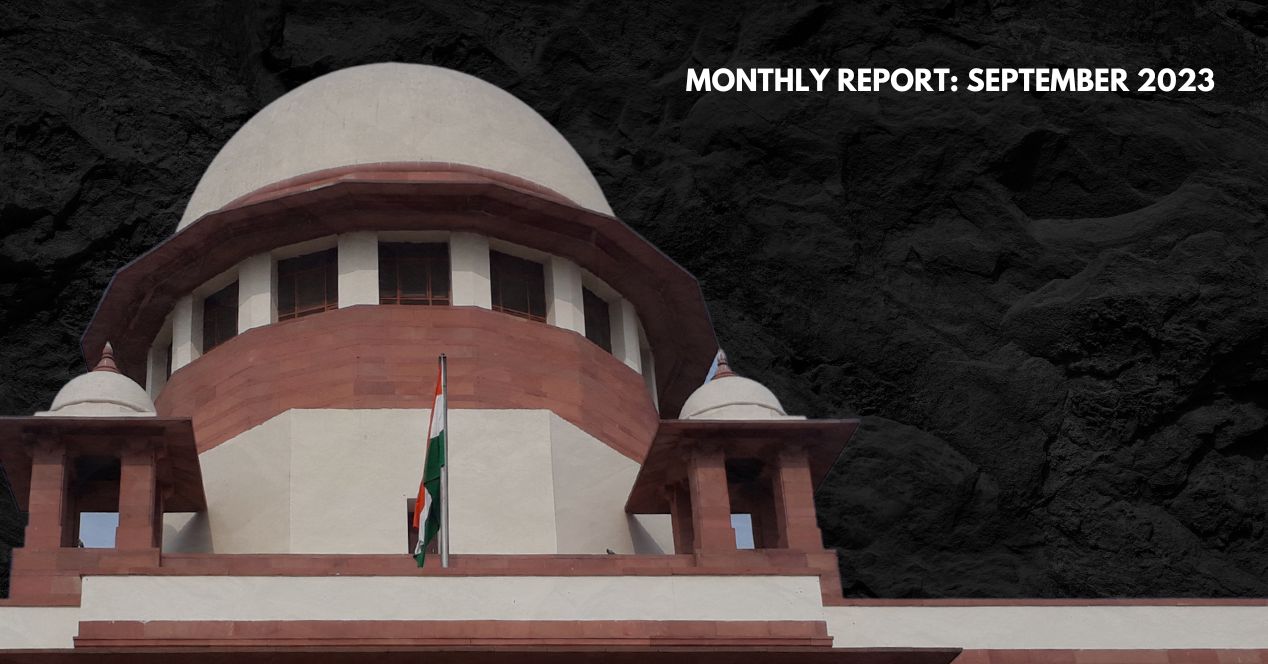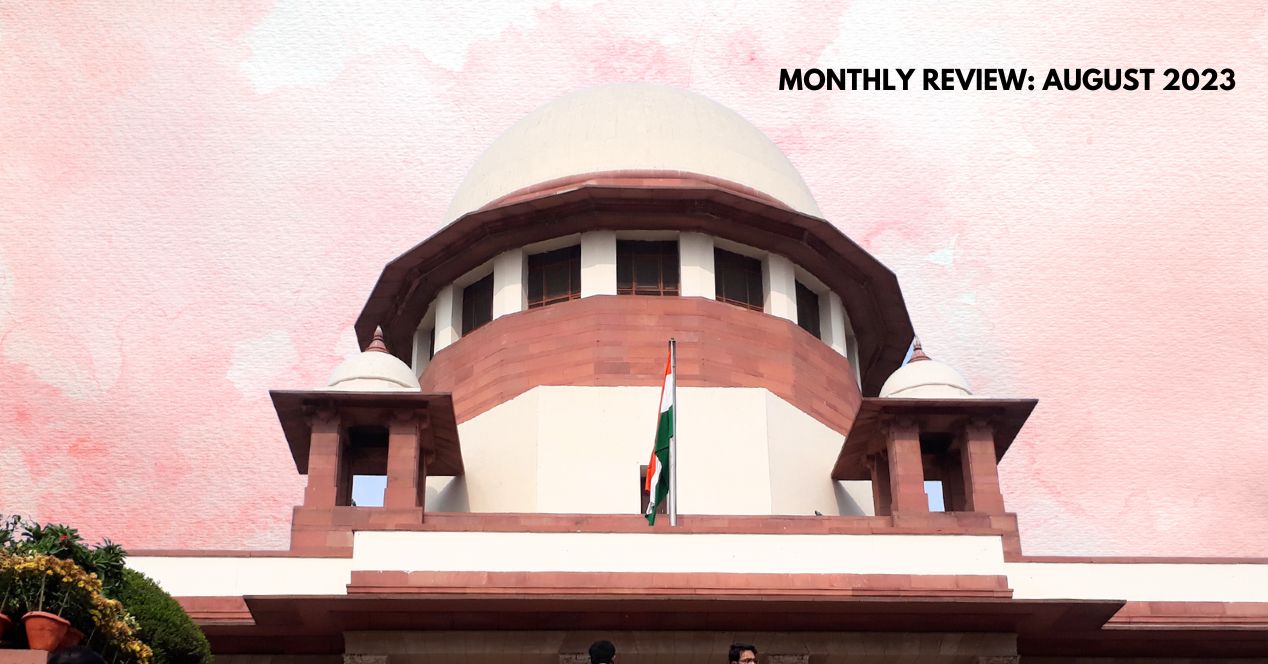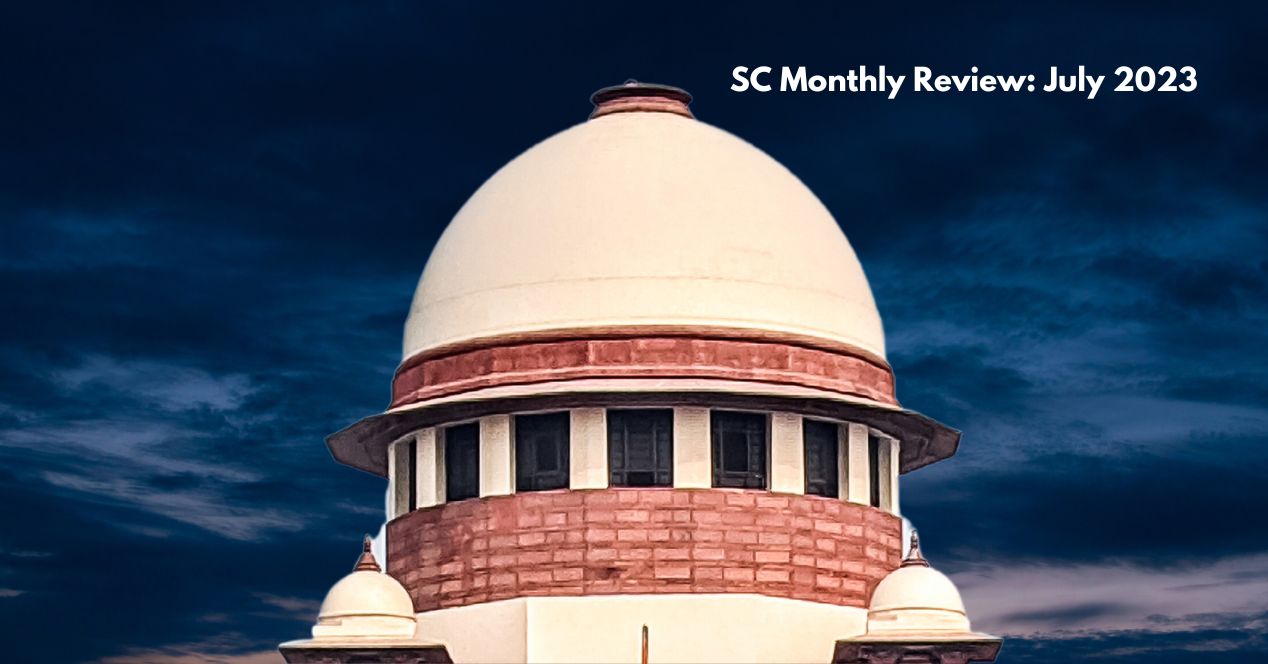Analysis
Monthly Review: November 2023
In November, the Supreme Court heard cases pertaining to elections and deferred the PMLA judgement review
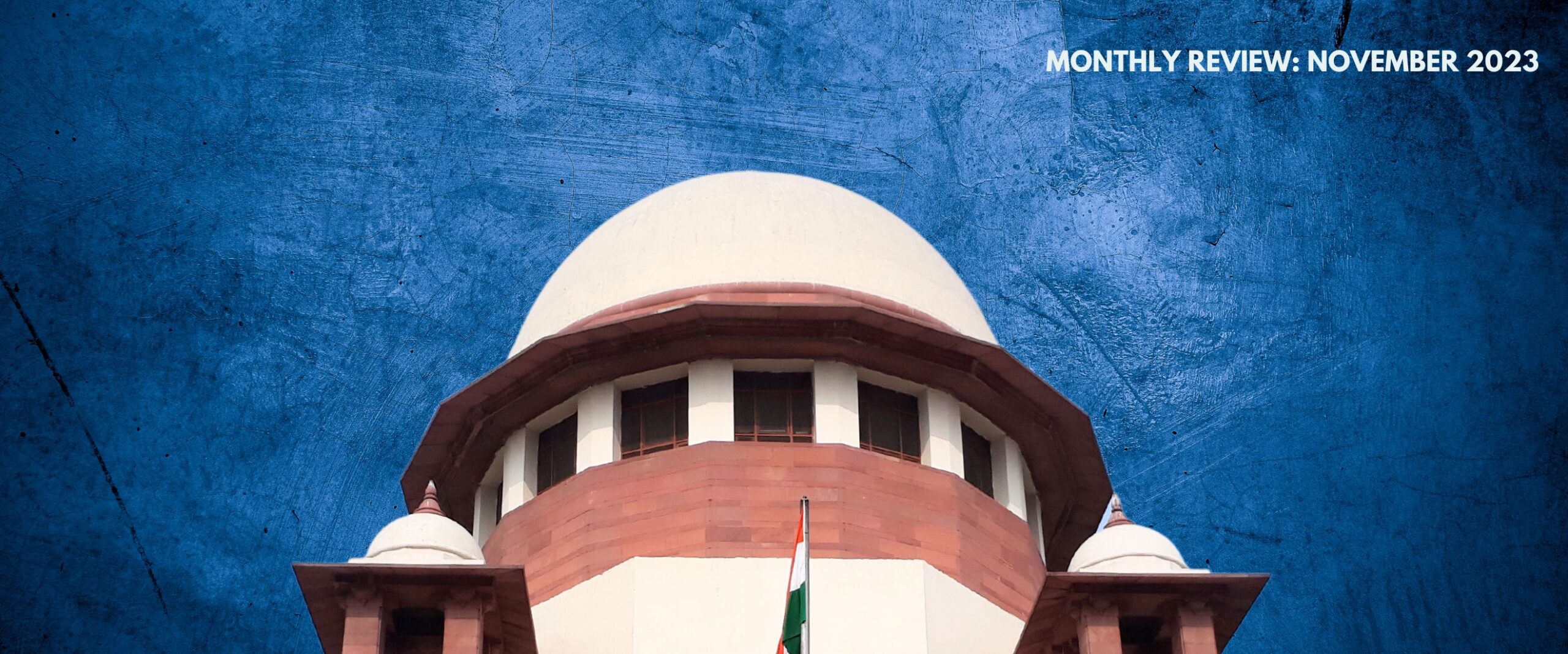
Constitutionality of the Electoral Bonds Scheme: Judgement Reserved
Constitution Bench led by CJI D.Y. Chandrachud continued to hear the challenge to the current electoral bonds scheme which facilitates anonymous corporate funding to political parties. On day 2 of hearings, Solicitor General Tushar Mehta began arguments in support of the scheme. He stated that “confidentiality” was at the heart of the scheme and not anonymity. He then argued that the 2018 electoral bonds scheme was simply one of many attempts to “eradicate the menace of unclean money” in election funding in India.
On 2nd November, the third and final day of hearings, the respondents concluded their arguments. They argued that the scheme protects donors’ right to privacy. To this, in the rejoinder arguments, Advocate Prashanth Bhushan appearing for the petitioners contended that privacy is an individual right flowing from the right to life and cannot be enjoyed by a company. After three days of arguments, the Bench reserved judgment in the case.
The Court will have to clarify where the balance of rights lies. When does the right to a transparent, free, and fair electoral process end and the right to privacy begin? The decision of the Court in the case will impact the funding mechanisms for the upcoming 2024 General Elections.
Review of the 2022 PMLA Judgement Postponed
On the 22nd and 23rd of November, a Special Bench of the Supreme Court comprising Justice S.K. Kaul, Sanjiv Khanna, and Bela Trivedi heard arguments on whether the 2022 Prevention of Money Laundering Act, 2022 (PMLA) judgement should be referred to a larger Bench.
Senior Advocates Kapil Sibal and A.M. Singhvi argued that the 2023 judgement was defective. However, due to Solicitor General Tushar Mehta’s unavailability in the subsequent weeks, the Bench deferred the hearings to a later date. The case will now be relisted before the Chief to be assigned a fresh Bench owing to Justice Kaul’s retirement on 25 December 2023.
Unclaimed Bodies in Mortuaries of Manipur
In August this year, the Supreme Court set up a committee to oversee the humanitarian aspects of the Manipur violence. The committee’s report was presented to the Supreme Court on 28 November. The report revealed that there were 175 dead bodies without burials and 169 of them were identified bodies, 81 were claimed by relatives, 88 were unclaimed and 6 were unidentified. The report also raised some serious concerns about the feasibility of cremation sites.
The court issued directions to ensure that the burial process was taken up without further delay while stressing zero interference from third parties, and the dignified burial of the bodies keeping in mind their religious beliefs.
Pendency of Bills Before the Governor
This month, the Supreme Court began hearing cases by the Kerala and Tamil Nadu governments challenging the Governors’ withholding of various bills in the states.
The Tamil Nadu government argued that the Governor could not simply withhold bills without giving an explanation. Senior advocates Dr. Abhishek Manu Singhvi, Mukul Rohatgi and P. Wilson who appeared for Tamil Nadu, pointed out that the Governor had violated Article 200 of the Constitution of India by neither responding to the bills promptly nor returning the bills to the assembly with a message. Wilson also argued that allowing the Governor to withhold a bill indefinitely would give them too much power over the legislature. The Supreme Court issued notice to the Union about the challenges in Tamil Nadu and Kerala and is set to hear the cases in the coming weeks.
A day before the 2nd day of hearings in State of Kerala v Governor for State of Kerala., the governor assented to one bill and referred the seven remaining bills to the President, who unlike the Governor is not bound by a deadline. Following this, Senior advocate K.K. Venugopal who appeared for the petitioners, sought a set of guidelines from the Court on the government’s powers and duties under Article 200.
This request was unsuccessful as the Bench noted that by assenting to one of the bills and referring seven for the President’s consideration, the Governor had indeed satisfied one of the petitioners’ requests.
Judicial Vacancies in the Lower Courts
Indian courts have before them, a huge docket of pending cases. One of the major contributing factors to this is the high number of vacancies in the lower judiciary. Supreme Court has been periodically monitoring steps taken by High Courts and State Governments to fill vacant judicial posts in the lower courts since 2018.
Hearings that began earlier this year continued into November. On Day 3 of hearings, the Court heard updates from Madhya Pradesh, Punjab and Haryana. After hearing about Madhya Pradesh’s “infrastructural problems” from Senior advocate Vijay Hansaria, who appeared as an amicus curiae, the Chief asked, “Why is the [Madhya Pradesh] High Court sleeping over its duties?”, demanding answers from senior advocate Arjun Garg, who appeared on behalf of Madhya Pradesh.
On Day 4, the Bench set deadlines for the filling up of vacancies in the district judiciaries of Tamil Nadu and Puducherry. The Bench specified that the selection process for vacancies in Tamil Nadu and Puducherry should be completed by March 2024 and December 2023 respectively.
On 20 November, the Bench convened once again, to discuss the vacancies in Jharkhand, Maharashtra and Kerala. The Bench directed the states to hold meetings with relevant stakeholders to address the issues and set timelines for filling vacancies and for completing infrastructural projects. Additionally, the court requested compliance reports from the three states by 30 April 2024.
Validity of ‘Light Motor Vehicle’ License to Drive ‘Transport Vehicle’
A five-judge Constitution Bench of the Supreme Court commenced hearing about the validity of a light motor vehicle licence to drive a transport vehicle in July 2023.
On 22 November 2023, the Bench directed all state governments to follow a timeline that was to be set by the Ministry of Road Transport and Highways of India (MORTH) for a consultation process to re-evaluate and subsequently amend the Motor Vehicles Act, 1988(MVA).
The Court is expected to hear this matter again on 17 January 2024.
Rights of personal guarantors in insolvency proceedings
On 9 November 2023, after hearing 391 petitions over 2 days, a three-judge Bench of the Supreme Court pronounced judgment in Anil Dhirajlal Ambani v Union of India. The Court upheld the constitutionality of certain sections of the Insolvency and Bankruptcy Code, 2016, which allow loan creditors to initiate insolvency proceedings against individual and partnership firm debtors.
Are Electoral Freebies a means to bribe voters?
During election campaigns, distributing freebies is quite common in India. But is it a social welfare scheme or a way of bribing voters?
A petition challenging the distribution of electoral freebies was filed in January 2022. Hearings started in 2022 and on 22 and 23 November 2023 a Division Bench of the Supreme Court led by CJI Chandrachud heard arguments on the validity of electoral freebies promised by political parties before elections.
Senior Advocate Vijay Hansaria who appeared for the petitioners argued that the Supreme Court’s previous ruling in S. Subramaniam Balaji v Government of Tamil Nadu which held that provision 123 of the Representation Of Peoples Act, (ROPA), 1951 only applies to individual candidates and not political parties, was flawed. He further contended that the Election Commission of India does not have the authority to prohibit electoral freebies.
Other notable orders and judgements
In response to a petition filed in October 2022 by a journalist collective, the Court on 7 November 2023, directed the Union government to form guidelines for the seizure of digital devices by investigative agencies. The Bench held that without clear guidelines, investigative agencies have wide scope to arrest, detain, search and seize individuals and their devices at will. A regulation for this was needed, to ensure privacy and to protect their freedom of speech and expression.
In another case, a Division Bench of the Supreme Court issued detailed guidelines to High Courts across India to expedite criminal cases against former and sitting Members of Parliament (MPs) and Members of Legislative Assemblies (MLAs.)
On 20 November 2023, a three-judge Bench heard petitions requesting directions to improve and expedite adoption processes. According to a portal developed by the Central Adoption Resource Authority (CARA) and the National Informatics Centre, there are 33,967 Prospective Adoptive parents but only 2,118 children that are “legally free for adoption” in the orphan, abandoned, or surrendered (OAS) category.
The Court directed the social justice department of every state and union territory to tackle the mismatch between parents who wish to adopt and children who are available for adoption.
SCO’s Features, Commentaries and Briefs
Disability rights litigation: a long way to Go
At 2.68 crores, India has one of the largest disabled populations in the world. Yet the legal framework doesn’t measure up. From children being abused in multi-therapy centres in Kerala to a disabled woman in Karnataka finding out that there was no State Disability Commissioner to report employment discrimination, the law and its implementation has a long way to go.
A petition before the Supreme Court in Seema Girija Lal v Union of India seeks to address these gaps in the law. In SCO’s feature, we explored the perpetual struggles, failure of localised adjudication, and other related topics.
Reservations for women in the higher judiciary?
In an interview with the Hindustan Times, CJI Chandrachud highlighted that more women are being recruited to the district judiciary than men. He also stated that more women were arguing cases after the introduction of the video-conferencing facility. However, he acknowledged the higher judiciary remained an “old boys’ club.” In SCO’s Desk Brief, our editor-in-chief explores existing data and possible solutions to tackle the issue of a lack of representation for women and marginalised communities. She asks, “Can there be real representation without reservations?”
Commentaries on the marriage equality judgement
A landmark judgement in October 2023, rejected marriage rights for sexual minorities in India. In the wake of the judgement, experts have analysed it in several ways.
Constitutional law expert Dr. Arvind Narrain argued that Justice Bhat’s majority opinion ignores how being in a relationship of a non-normative kind could render precarious the enjoyment of fundamental rights.
Assistant Professor and PhD candidate Diksha Sanyal contended that the judgement proved to be a lost opportunity to lay the groundwork for a more inclusive regime of rights.
On the other hand, lending her support to the judgement, Jannani M, a practitioner based in Chennai asserted that the courts were the wrong forum to approach.
The 36th LAWASIA Conference
In other news, SCO was the official lead media partner for the 36th LAWASIA Conference in Bangalore this year. Spanning over four days, we had the opportunity to interact with various Supreme Court Judges and members of the Bar from across the Asia Pacific.
Justice B.V. Nagarathna (Judge, Supreme Court of India), Justice S.K. Kaul (Judge, Supreme Court of India), Justice Naima Haider (Supreme Court of Bangladesh), Justice Arjuna Obayasekre (Supreme Court of Sri Lanka), and Justice Sapana Malla (Supreme Court of Nepal) spoke to SCO about access to justice, independence of the judiciary, political views and being a judge and more.
In addition, Senior advocates C.U. Singh and C.S. Vaidyanathan shed light on the Indian legal landscape. They highlighted the accountability of government officials and the role of technology in lawyering.
On 26 November 2023, as India celebrated the 74th Constitution Day, Justice B.V. Nagarathna and Justice S.K. Kaul stressed the importance and the need for a united front.

